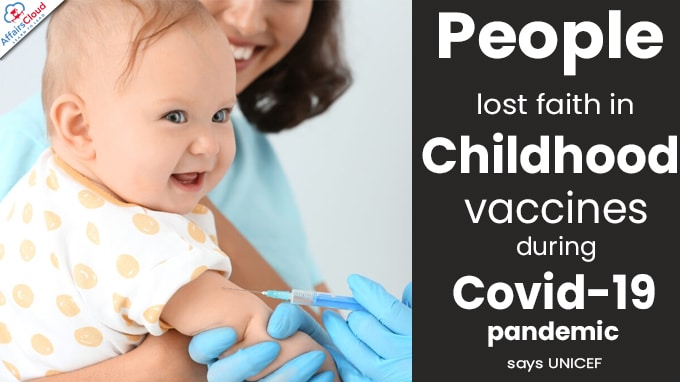 According to the new report titled “State of the World’s Children 2023: For Every Child, Vaccination” published by United Nations Children’s Fund, (UNICEF), the routine vaccination coverage for the children has declined during the COVID-19 pandemic.
According to the new report titled “State of the World’s Children 2023: For Every Child, Vaccination” published by United Nations Children’s Fund, (UNICEF), the routine vaccination coverage for the children has declined during the COVID-19 pandemic.
- According to the report, around 67 million children missed out on one or more vaccinations over 3 years with vaccination coverage levels decreasing in 112 countries.
- This decline is due to service disruption caused by strained health systems and diversion of scarce resources, conflict and fragility, and decreased confidence.
- According to the 2023 report, India is one of the countries with the highest vaccine confidence in the world.
Note:
i.The State of the World’s Children report, Published by UNICEF since 1980, aims to deepen knowledge and raise awareness of key issues affecting children, and advocates for solutions that improve children’s lives.
ii.The data for the report was collected by the Vaccine Confidence Project at the London School of Hygiene and Tropical Medicine.
Confidence towards importance of vaccine for Children:
According to the survey conducted in 55 countries, in around 52 countries the public perception of vaccines for children declined between 2019 and 2021.
- In countries like Papua New Guinea and South Korea, the agreement towards the importance of vaccines for children declined by 44% and by more than a third in Ghana, Senegal and Japan.
- In the United States of America(USA), it declined by 13.6% while in countries like India, China and Mexico, confidence towards vaccines remained broadly the same or increased.
Despite the declining confidence towards vaccines for children, more than 80% of the respondents in around 50% of the countries agreed that vaccines are important for children.
Key Points:
i.Globally 1 in 5 children are unvaccinated and under-vaccinated, leaving them vulnerable to a range of vaccine-preventable diseases.
- The study found that unvaccinated children often live in hard-to-reach communities such as rural areas or urban slums.
- These challenges are greatest in low- and middle-income countries, where about 1 in 10 children in urban areas are zero doses and 1 in 6 in rural areas.
- In upper-middle-income countries, there is almost no gap between urban and rural children.
ii.Around 1 in 5 children have no protection against measles and 7 in 8 eligible girls are not vaccinated against human papillomavirus (HPV), which can cause cervical cancer.
iii.In 2022, for example, the number of measles cases was more than double the total in 2021.
iv.The number of children paralysed by polio was up 16 percent year-on-year in 2022.
v.Comparing 2019 to 2021 period with the previous 3-year period, the number of children paralysed by polio has increased by 8 times.
About United Nations Children’s Fund(UNICEF):
United Nations Children’s Fund (UNICEF) was formerly known as United Nations International Children’s Emergency Fund.
Executive Director– Catherine M. Russell
Headquarters– New York, United States of America(USA)




